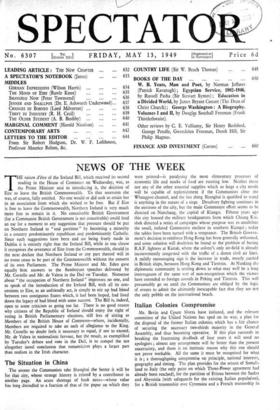The Situation in China
The sooner the Communists take Shanghai the better it will be for that city, whose strange history is related by a contributor in another page. An acute shortage of bank notes—whose value has long dwindled to a fraction of that of the paper on which they
were printed—is paralysing the most elementary processes of economic life and stocks of food are running low. Neither these nor any of the other essential supplies which so large a city needs will be capable of replenishment if the Communists close the Whangpoo channel, and the last thing Shanghai is qualified to stand is anything in the nature of a siege_ Desultory fighting continues in the environs of the city, but the main Communist effort seems to be directed on Nanchang, the capital of Kiangsi. Fifteen years ago this city housed the military headquarters from which Chiang Kai- shek directed a series of campaigns whose purpose was to annihilate the small, isolated Communist enclave in southern Kiangsi ; today the tables have been turned with a vengeance. The British Govern- ment's decision to reinforce Hong Kong has been generally welcomed, and some solution will doubtless be found to the problem of basing R.A.F. fighters at Kaitak, where the colony's only air-field is already inconveniently congested with the traffic of a dozen civil air lines. A mildly encouraging sign is the increase in trade, mostly .carried in British ships, between Hong Kong and Tientsin. At Nanking thz diplomatic community is settling down to what may well be a long interregnum of the same sort of non-recognition which the victors have extended to foreign consuls in Peking and Tientsin. This will presumably go on until the Communists are obliged by the logic of events to admit the ultimately inescapable fact that they are not the only pebble on the international beach.






































